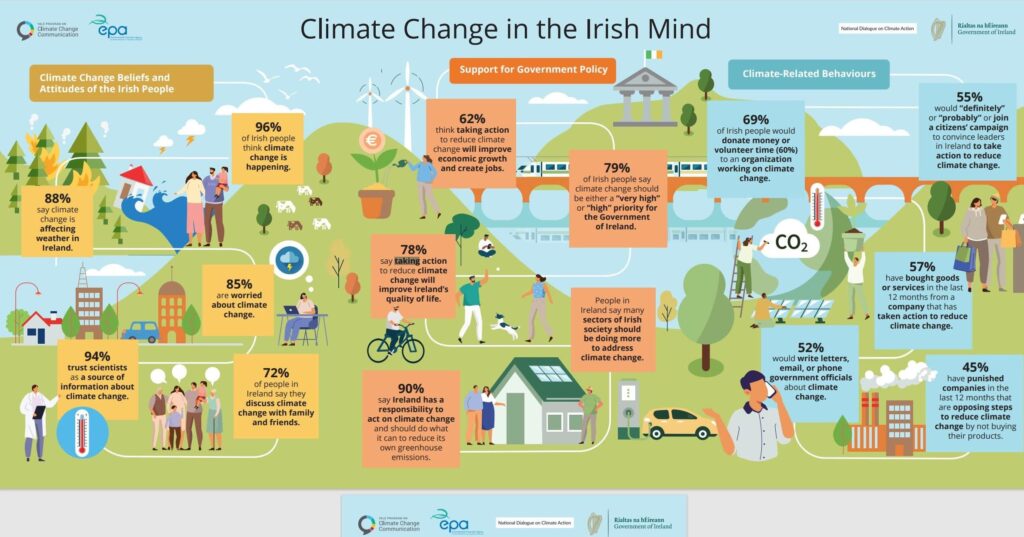Ireland’s journey towards a greener future is marked by dynamic governmental policies and vibrant public opinion. This small yet progressive nation in the North Atlantic is setting significant benchmarks in environmental policy, attracting global attention. The intricate dance between government actions and public sentiment reveals a complex and engaging narrative worth exploring. This article delves into the multifaceted approaches Ireland has adopted to tackle environmental challenges, while also examining the public’s perception and involvement in these efforts.
Government Initiatives: Leading the Green Charge
Ireland’s government has implemented a series of ambitious policies to address climate change and promote sustainability. One of the cornerstone initiatives is the Climate Action Plan, which outlines a roadmap to achieve net-zero greenhouse gas emissions by 2050. This plan includes a range of measures, from transitioning to renewable energy sources to enhancing energy efficiency in buildings and industries. For instance, significant investments are being made in wind and solar power projects, which are pivotal in reducing the country’s reliance on fossil fuels. Additionally, the plan mandates stricter emission standards for vehicles and encourages the adoption of electric cars through subsidies and infrastructure development.
Beyond the Climate Action Plan, the government has also introduced policies to protect biodiversity and natural habitats. The National Biodiversity Action Plan aims to halt biodiversity loss and restore degraded ecosystems. This involves reforestation projects, the creation of protected areas, and the promotion of sustainable agricultural practices. These efforts are not only crucial for preserving Ireland’s rich natural heritage but also play a significant role in mitigating the impacts of climate change. By fostering a sustainable relationship with the environment, the government is working towards a future where economic growth and ecological health go hand in hand.
Public Opinion: Voices of Support and Skepticism
Public opinion in Ireland regarding environmental policies is a fascinating mix of support, skepticism, and active participation. Surveys indicate that a majority of Irish citizens are highly supportive of government actions aimed at combating climate change. This widespread support is reflected in the increasing number of community-led environmental initiatives and grassroots movements. For example, local groups are organizing tree-planting drives, beach clean-ups, and educational campaigns to raise awareness about sustainability.
However, not all voices are in unanimous agreement. There is a notable segment of the population that expresses skepticism about certain government policies, particularly those that might impact the economy or individual livelihoods. For instance, farmers have raised concerns about policies that restrict traditional agricultural practices in favor of more sustainable methods. They argue that these changes could threaten their income and way of life. This tension highlights the challenge of balancing environmental goals with economic and social considerations, a delicate act that requires ongoing dialogue and compromise between the government and its citizens.

The Role of Innovation and Technology
Innovation and technology are pivotal in Ireland’s strategy to address environmental challenges. The government has been fostering a culture of innovation by supporting research and development in green technologies. One prominent example is the development of smart grid technology, which optimizes energy distribution and consumption. Smart grids not only enhance the efficiency of renewable energy sources but also provide consumers with greater control over their energy use. This technological advancement is expected to play a critical role in achieving the country’s climate targets.
Moreover, Ireland is embracing the concept of the circular economy, which aims to minimize waste and make the most of the resources. This involves redesigning products and processes to extend their lifecycle and reduce environmental impact. Start-ups and established companies alike are innovating in areas such as recycling, sustainable packaging, and resource recovery. The government supports these efforts through grants, tax incentives, and a favorable regulatory environment.
Conclusion
Ireland’s approach to environmental policy is a compelling blend of ambitious government initiatives, active public involvement, and cutting-edge innovation. The government’s comprehensive strategies, supported by public engagement and technological advancements, form a robust framework for tackling environmental challenges. However, the journey is fraught with challenges, requiring a delicate balance between ecological goals and economic realities. As Ireland continues to navigate this path, its experiences and lessons offer valuable insights for other nations striving towards sustainability. Through continued collaboration and innovation, Ireland is poised to make significant strides in its quest for a greener and more sustainable future.



